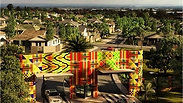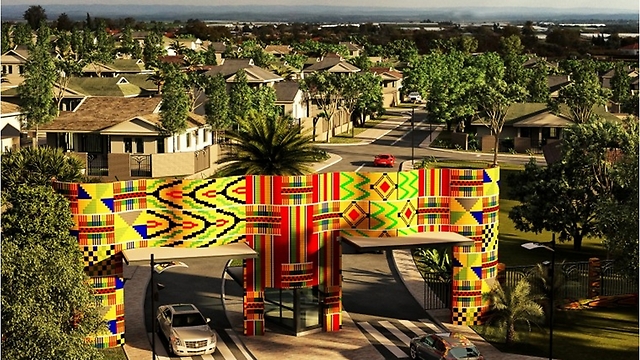
AlefBet Planners Rural Development Project in Ghana
Photo: Daphna Regev/AlefBet Planners

Successful Israeli firm helps African development by exporting the kibbutz model
A successful architectural and engineering Israeli company is exporting the renowned kibbutz model throughout the world; now, in African countries like Angola and Nigeria, one can see the Israeli model prosper, developing the region and creating hundreds of jobs.
AlefBet Planners Ltd. is one of the most successful architectural and engineering companies in Israel using Israeli know-how and expertise accumulated throughout the years to design a variety of projects in the fields of agriculture, rural development, architecture, and industry.
While the company was founded at the State of Israel’s inception and acted as the planning arm of the original collective agricultural communities known as kibbutzim, the firm today successfully exports, among others, the renowned kibbutz model throughout the world.
On the occasion of the celebration of Israel’s 69th Independence Day, Daphna Regev, business and development manager at AlefBet Planners, spoke with Tazpit Press Service (TPS) about the project’s success.
“Our country is very unique,” Regev said. “The conditions for agriculture are extremely difficult because of the shortage in water resources, the scarcity of land, and a challenging climate. Moreover, we are a very isolated country in the region due the trapping presence of surrounding enemies.”
“We had to create an innovative type of agricultural system in order to survive and thrive, one that takes into account all the parameters needed for the sustainable growth of produce,” Regev explained. “We had to create solutions for watering and develop a system that would succeed in regions like the Negev and the coastal plain despite adverse climate conditions.”
“This is why Israel is now a world leader in drip irrigation, which preserves water resources, and we perfected greenhouses that are equipped with proper cooling and warming systems along with adequate monitoring,” continued Regev. “This incomparable know-how and experience is valuable to countries around the world constantly sending delegations to Israel to observe, learn, and to later implement those techniques in their own countries.”
In Angola, AlefBet planned the establishment of a dozen of kibbutz-style villages, which included a residential area and agricultural plot for each family. The firm established logistics centers in the villages and those provide farmers with the necessary support for the marketing of fresh produce and technical services. The resulting development of infrastructure throughout the region has created hundreds of jobs.
Another of AlefBet’s projects in Nigeria will consist of three villages over an area of 50,000 hectares. Each village is designed to have 100 residential units, a chicken coop, a greenhouse, and farmland. A rural service center, an energy and water center, and a leisure area will be located at the center of each village. The three villages will have a common community center, a school, a medical clinic, and sports fields.
“Every project is tailor-made to the specific needs of the people and the on-site parameters, such as climate, soil, and the level of industry there, but also in accordance with the inhabitants themselves and their culture,” Regev said.
“What is certain is that we have helped the standards of living in those villages which in turn greatly improved the regional economy,” Regev concluded. “We can safely say that 69 years of Israeli agro-industrial innovation has enabled AlefBet planners to help the world fight hunger and poverty.”
Article reprinted with permission from TPS
















